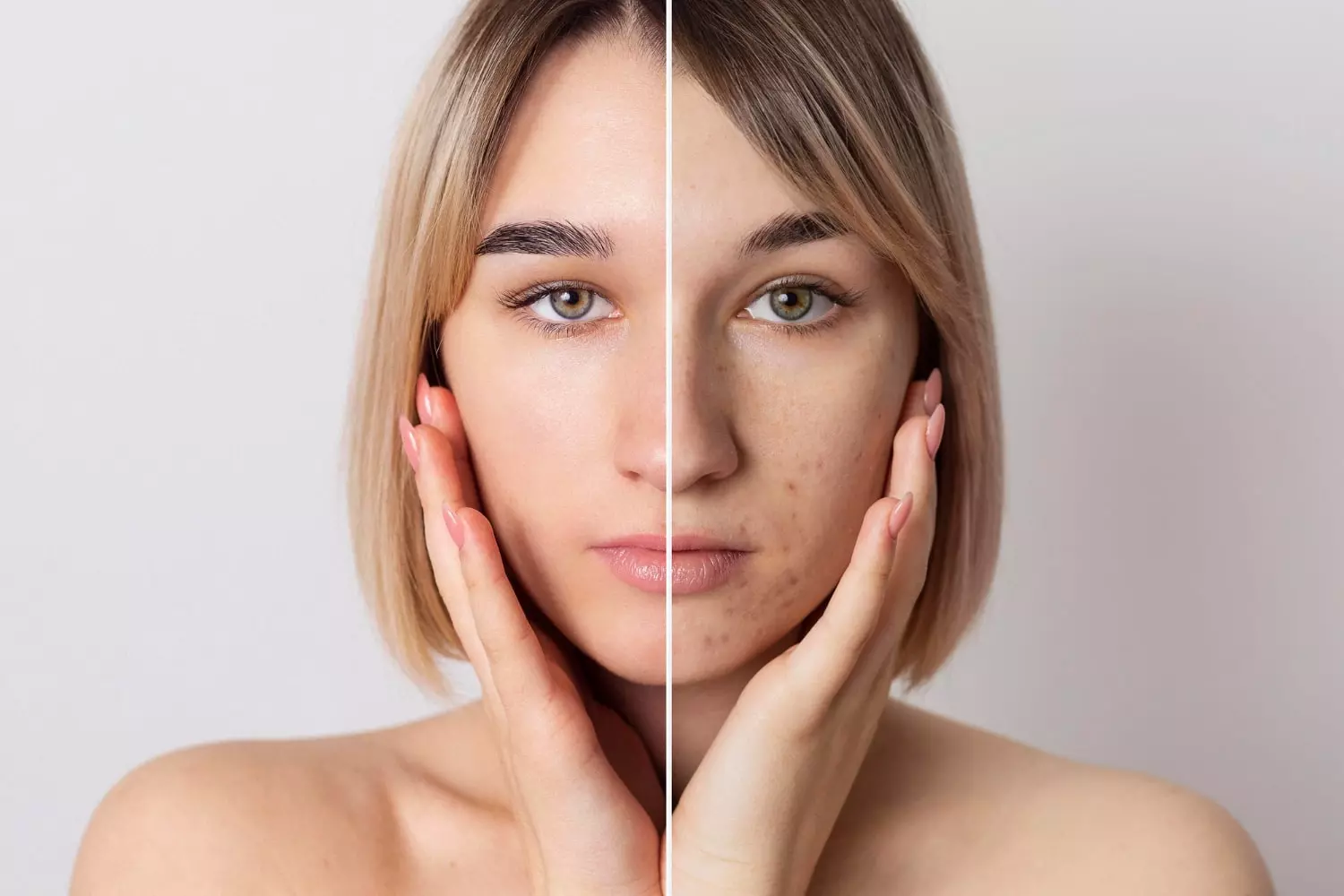Are you one of those individuals who find themselves in a dilemma when faced with makeup? Do you experience anxiety at the mere thought of applying cosmetics to your skin? If the idea of makeup sends shivers down your spine, you might be dealing with a condition known as maquillaphobia.
In a world where everyone is willing to look good by applying makeup, there are still some individuals who do not want to apply makeup. The global makeup market is predicted to be worth approximately $85 billion in 2024.
Remember, beauty is not a mandate but a choice, and makeup is a tool for those who seek to enhance their beauty. Almost everyone wants to look their best by using makeup. People here enjoy putting on makeup. It’s not because they have to, but because they want to.
On the other hand, some individuals live in a world where makeup seems like a source of fear and anxiety to them. No one talks about them and their betterment, as they are in minute quantity.
In this comprehensive article, we will talk about them and will delve into the world of maquillaphobia, exploring its definition, its impact, and ways to cope with it.
Define Maquillage:
Before knowing this phobia, it’s essential to understand what maquillage is. Maquillage is a French term that refers to makeup or cosmetics. It includes products like foundation, lipstick, eyeshadow, mascara, and more.
What is Maquillaphobia?
| As Maquillage means makeup and cosmetics, and phobia means fear, then collectively maquillaphobia will mean fear of makeup or makeup phobia. |

It is a condition that affects individuals who have an intense fear or aversion to makeup and cosmetic products. This fear is often associated with the concerns about potential harm to the skin or adverse reactions. The side effects of cosmetics have made people conscious about it. That’s why 58% of American women buy cosmetic products which are organic or natural.
It is a relatively lesser-known phobia, but can significantly impact a person’s daily life. It’s important to understand that this fear is not limited to a single gender or age group; anyone can experience this makeup phobia. Furthermore, it can manifest in various forms, from anxiety about wearing makeup to avoiding situations where makeup is involved. Like most of the other fears, this fear could also be an illusion.
Causes and Triggers of Maquillaphobia:
Understanding what causes or triggers this phobia of makeup is essential for a more comprehensive perspective. This phobia can be rooted in various factors, including:
Past Negative Experiences:
A significant cause of this phobia can be past negative experiences with makeup. This may include allergic reactions, skin irritations, or makeup mishaps that have left a lasting impression of fear of makeup.
Perception of Fakeness:
Makeup is often used to alter or enhance one’s appearance by concealing imperfections, changing facial features, or creating a desired aesthetic. This alteration of natural appearance may lead some individuals to perceive the result as “fake.”
Experiencing remarks of fakeness or criticism after applying makeup can contribute to the development of maquillaphobia.
When a person gets negative remarks about the perceived “fakeness” of his makeup, it would distort his self-image and perception.He would internalize these comments and begin to view himself as artificial or inauthentic when wearing makeup, even if he initially enjoyed using it.
Cultural Beliefs:
Cultural beliefs and traditions can also influence one’s attitude towards makeup. In some cultures, makeup is discouraged or viewed as unnecessary, leading to phobia of makeup.
Peer Influence:
Peer influence, especially during adolescence, can contribute to it. If friends or peers make negative comments or judgments about someone’s makeup or appearance, it can create fear of makeup.
Personal Beliefs and Values:
Some individuals may have personal beliefs or values that conflict with the use of cosmetics. This could be related to concerns about animal testing, environmental impact, or chemical ingredients in makeup products.

Psychological Factors:
Underlying psychological factors such as anxiety disorders or obsessive-compulsive tendencies can contribute to it. These conditions can amplify fears related to makeup.
Family Influence:
Family attitudes and beliefs about makeup can play a significant role. If a person grew up in an environment where makeup was discouraged, it can contribute to the development of this fear.
Prevalence and Statistics:
When we look at the proportion of people who love makeup and those who have phobia of makeup, then obviously makeup-lovers are more, but we can’t deny the existence of others. There are no statistics of its incidence yet, but it is confirmed that maquillophobic people do exist, although in insignificant amounts but yes they do exist.
What are the Side Effects of Makeup?
Mostly people become phobic of makeup because of its side effects, so understanding the potential side effects of makeup is crucial for individuals with maquillaphobia. While makeup is generally safe for most people, it’s important to be aware of the possible adverse reactions, which include:
Skin Irritation:
Some makeup products may contain ingredients that can irritate sensitive skin, leading to redness, itching, or rashes.
Acne Breakouts:
Excessive use of makeup or failure to remove it properly can clog pores and contribute to acne breakouts.
Prolonged exposure to clogged pores can lead to the formation of comedones, which include both blackheads and whiteheads.
Blackheads occur when the clogged pore remains open and exposed to air, causing the trapped debris to oxidize and darken. Whiteheads occur when the clogged pore remains closed, resulting in a small, flesh-colored bump on the skin.
Additionally, overuse, improper removal, and sharing makeup tools can further contribute to acne breakouts.
Allergic Reactions:
Individuals with allergies may react to certain makeup ingredients, resulting in symptoms such as swelling, itching, or hives.

Skin Sensitivity:
Makeup can sometimes make the skin more sensitive, making it prone to reactions even to products that were previously well-tolerated.
Aging Effects:
Frequent use of heavy makeup may contribute to premature aging of the skin by clogging pores and preventing proper skin respiration.
It’s important to note that these side effects are not exclusive to individuals with maquillaphobia and can affect anyone who uses makeup.
However, those with phobia of makeup may be more prone to exaggerated fears regarding these potential issues.
Treatment Options:
Remember, it is not necessary to treat this condition. If you are okay with it, then you should go with it. But if you want to overcome this fear and want to start using makeup again, then it is for you:
Overcoming maquillaphobia can be a gradual process that involves understanding and addressing the underlying causes and triggers of the fear. Here are some steps to help individuals overcome the fear of makeup:
Identify Maquillaphobia triggers:
Try to identify the specific triggers that make you anxious about makeup. Is it certain products, situations, or people? Knowing your triggers can help you address them more effectively.
Education:
Educate yourself about makeup products and their ingredients. You should have a know-how of all the ingredients of a cosmetic which you are using. It is necessary to know both its normal effects and its side effects.

Start Small:
Gradually expose yourself to makeup in a controlled and comfortable environment. Start with minimal or natural makeup and increase the complexity as you become more comfortable.
Therapy:
Cognitive-behavioral therapy and exposure therapy can help individuals address their phobia and develop coping strategies.
Conclusion:
Maquillaphobia is a complex condition that can affect individuals in various ways. Whether you are personally dealing with phobia of makeup or supporting someone who is, seeking professional help, such as therapy or counseling, can be a valuable step toward overcoming fear of makeup and improving overall well-being.
As we discussed above, “beauty is not a mandate but a choice”, so makeup should also be a choice rather than a compulsion or any source of anxiety. The ones who want to apply makeup should apply it, but on the other hand, we shouldn’t criticize the ones who don’t like applying it. Beauty is not just about the external appearance, rather it is about inner qualities such as kindness, empathy, accepting the imperfections of others etc.
That’s why beauty standards should not be set up on the basis of makeup.
Call to Action:
If you are too concerned about this condition, then you should consult it with a dermatologist. Your dermatologist will examine your skin type and will recommend to you those makeup products which are compatible with your skin. So it would mitigate your maquillaphobia.
FAQs
Is Maquillaphobia a real thing?
Yes, it is a real thing and it does exist in some people.
Why do I have a fear of makeup?
Maybe because you would have a past bad experience of using makeup.

